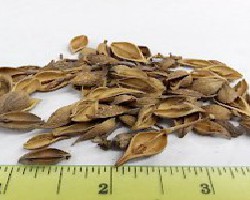Herbal Medicine
Theory, Formulations, and Applications
TCM Herbal Medicine Database, Theory, Clinical Applications, and Resources
Chinese Medicine is comprised of a few principle components - acupuncture, herbal medicine, tuina massage, diet/lifestyle habits, and associated techniques such as cupping and moxibustion. Our Herbal Medicine section explores both individual herbs and their use in combinations, or "formulas".
This is an extensive subject and no single source can convey the full breadth and depth of Herbal Medicine. Accordingly, this section is a work in progress.
Our individual TCM herb section has a complete alphabetical view, or you may view by by functional grouping, by channel influences, or by taste / temperature properties. We also have some of the more common precautions noted.
TCM Herb of the Day

- Clear heat and toxins, dissipates nodules - carbuncles and hot sores, neck lumps.
- Expel wind-heat - fever, slight chills, sore throat, headache.
Our TCM formula section has a complete alphabetical listing of most commonly used formulas. Clinically, formulas are more commonly chosen for their functions, accordingly we have listings by functional groupings as well.
TCM Formula of the Day

- A very important formula to stop bleeding (generally from any cause) in Chinese Medicine. Can be used topically and orally and comes in two primary formats (capsules and powder vials). It is used in households around the world for general traumas, but also in the Chinese military for gun shut wounds and other significant traumas to the body. May be used in the right situations for gynecological issues such as menorrhagia, retention of the placenta, etc.
- Used in humans and animals for bleeding from cancer and other internal tumors.
- Generally speeds healing of trauma, can be supportive for those undergoing surgery.
- Note that the powder vials often contain a red pill at the very top of the bottle - this is generally only used if you are going into shock or someone is in shock - the contents are an undisclosed Chinese military secret as yunnan baiyao is only made from one manufacturer in the world and is a state-sponsored formula.
Our Herbal Shop has an alphabetical listing of the formulas we most often use with our own patients. We strongly recommend consulting directly with a practitioner before attempting herbal therapy.
Herbal Product of the Day

- Please note that there are two formulas with the same name but slightly different compositions. One is from Wang's Wen Re Jing Wei and tonifies the yin more strongly, the other (which is the one discussed here) is from Li's Pi Wei Lun (Discussion of the Spleen and Stomach) and tonifies the spleen more strongly. Both have similar usages but are not directly interchangeable.
- Clears summerheat and dries dampness - summer colds and flus, heatstroke - fever, fatigue, excessive sweating with loose stools and heaviness in the body.
- Along with respiratory infections in the right cases certain types of asthma may be appropriate for this formula.
- Dampheat related inflammatory condtions such as Colitis are approprirate with the right underlying factors.
- Chronic Fatigue Syndrome with symptoms of spleen deficiency and heat.
- Wtih the right underlying factors the range of perimenopausal symptoms may be appropriate - low libido, fatigue, water retention, fibroids, heavy cycles. Where this appear with spleen qi deficiency signs and kidney weakness, this formula may be appropriate.
All Content 1999-2024
Chad J. Dupuis / Yin Yang House
Our Policies and Privacy Guidelines
Our Affiliated Clinics
